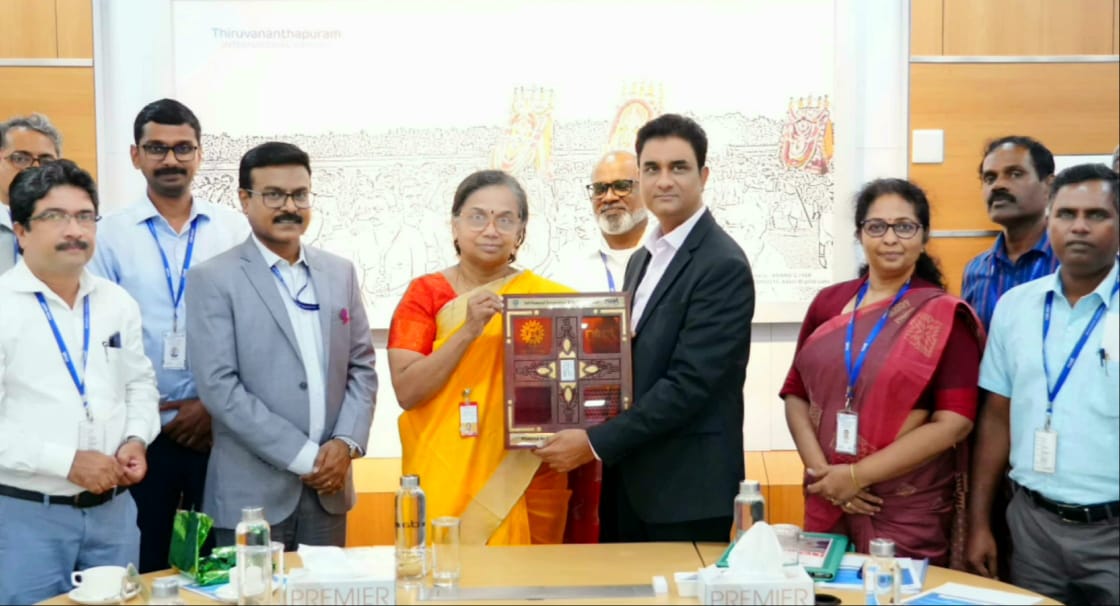Self-powered Indoor Air Quality Monitors developed by CSIR-NIIST has been installed at the Thiruvananthapuram International Airport (TIA) to keep a close tab on air quality parameters at the airport.
Dr. N. Kalaiselvi, Director General, Council of Scientific and Industrial Research (CSIR) and Secretary, Department of Scientific and Industrial Research (DSIR), presented these cutting-edge monitors to Mr. Rahul Bhatkoti, Chief Airport Officer of TIA at a special function held at the airport last evening.
The indigenous indoor solar cells were developed by National Institute of Interdisciplinary Science and Technology (NIIST), Pappanamcode, in the city.
The event also marked the exchange of a Memorandum of Understanding (MoU) between CSIR-NIIST and TIA, paving the way for further collaborations in this domain.
Dr. Kalaiselvi emphasized that sustainable solutions, such as those powered by NIIST’s indoor solar cells, not only reduce carbon footprints and operational costs but also provide continuous, reliable data for timely interventions, thus promoting environmental stewardship and aligning with global sustainability goals.
This partnership is also a prime example of translating high-end scientific research into practical applications, she said.
Mr. Bhatkoti said adoption of sustainable products in airports is both a responsibility and a necessity for the future. Installation of these self-powered indoor air quality monitors will significantly reduce carbon footprint at the airport and ensure passenger and staff health and safety, he said.
NIIST Director, Dr C Anandharamakrishnan explained the unique features of the monitors, which utilize custom-designed dye-sensitized solar modules, and are available in various colors and designs, integrating seamlessly into indoor environments by recycling ambient light to power the devices.
This approach supports a greener and more sustainable future, he said, adding that NIIST is at the forefront of pioneering transformative, sustainable solutions by seamlessly merging science, technology, and art, contributing to a greener and healthier future for all.
The Air Quality Monitor consists of various sensors that measure temperature, humidity, Carbon Dioxide (CO2), Carbon Monoxide (CO) and Volatile Organic Compounds (VOCs) and also measures Air Quality Index (AQI). These measurements are all displayed onto a single screen.
NIIST is also in the process of developing an app which will enable the readings to be displayed on smartphones and on public display screens in the airport.
Air travel has become a cornerstone of global economic development, with a remarkable increase in both domestic and international flights over the past decade.
According to the International Civil Aviation Organization (ICAO), approximately 4 billion passengers travel by air each year. Indoor air can be up to five times more contaminated than outdoor air. Airports, with their high traffic of individuals from diverse regions, are potential hotspots for airborne diseases, Dr Anandharamakrishnan added.
Project leader Dr, Suraj Soman, Senior Scientist, CSIR-NIIST and Dr. K. N. Narayanan Unni, Senior Principal Scientist, and Head of CSIR-NIIST’s Centre for Sustainable Energy Technologies said NIIST is working to enhance the product’s functionality with additional sensors and IoT connectivity, marking the dawn of a new era in air quality management for aviation.
Leading the way in innovation, CSIR-NIIST has harnessed its expertise in dye-sensitized solar cells to create off-grid, wireless, self-powered indoor air quality monitors partnering with their industrial partner Embedite Technologies.




